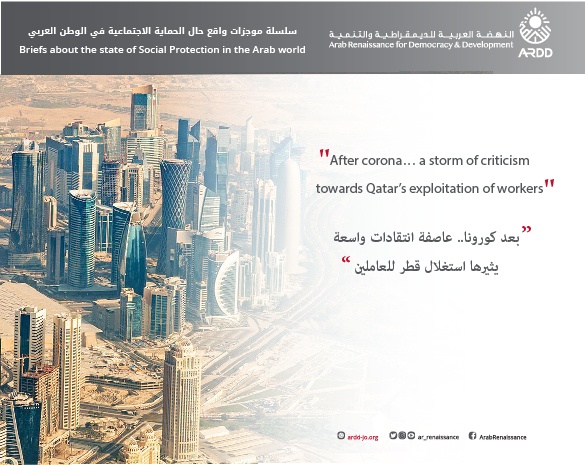Since the spread of corona in Qatar, the storm of criticism aimed at the status of guest workers who face harsh conditions or are illegally laid off, especially in the Doha Industrial Area, would not calm1.
This criticism increased after Amnesty International called, in an official statement, for the provision of social protection for workers, including protection from exploitation, abuse and discrimination, especially considering that some workers live in poverty, lack both shelter and income.
Having carried out a series of research revolving around the reality of social protection in the Arab world, the Arab Renaissance for Democracy and Development (ARDD) now presents Qatar’s measures and responses to the corona pandemic, as well as the measures it took to protect vulnerable groups such as the poor, the elderly, children, migrants, refugees and people with disabilities.
From the start of the crisis, Qatar had the highest number of confirmed cases per capita. The country’s response, particularly its neglect of guest workers ignited widespread criticism2.
According to the International Labour Organisation, Qatari authorities forcibly detained hundreds of Nepali workers under the excuse of carrying corona tests on them and deported them without allowing them to even pack their belongings and without them receiving their payments3.
In contrast, as part of its social protection strategy for its own citizens, Qatar took many different measures, allocating a 75-million Qatari riyal financial incentive to support the private sector, lending 3 billion Qatari riyals to affected firms to cover the workers’ salaries and rent, providing free health care and carrying out awareness campaigns4.
It also gave medical aid to over 20 countries and $140 million in aid to medical care institutions working on vaccinations and quality medical care, especially in developing countries5.
Qatar initially denied that coronavirus had spread among prisoners. However, according to Human Rights Watch, the virus has spread in Doha’s central prison; HRW urged the Qatari prison administration to take urgent measures to provide better protection to prisoners and staff to avoid the spread, by reducing the number of prisoners, implementing appropriate protocols for personal hygiene and cleaning, and providing training and appropriate equipment, such as face masks, disinfectants and gloves6.
The elderly in Qatar appear to have got the lion’s share of health and medical care. Hundreds of volunteers offered to serve the elderly, buy their basic items and cover their daily needs, to help them avoid leaving their homes, one of the preventive measures in the fight against corona7.
Moreover, more than 1,000 online consultations were provided for people over 60; that included medical inquiries and physiotherapy guidance. More than 14,500 prescriptions were issued and a home delivery service was activated, as well as hotline services for vulnerable elderly patients8.
At the level of community and youth initiatives, a programme to deliver food packages to workers was launched, awareness leaflets were made in seven languages, videos about measures to protect against the virus were shared on social media, and 100,000 personal care bags were prepared and distributed9.
There has been an increase in demand for supporting civil society organizations in Qatar to fulfill their role and make use of volunteers to fight the corona pandemic and help the community and the state.
(1) Qatar faces an unprecedented crisis with the highest corona cases in the Arab World
(2)(3) Qatar threatens to enforce strict penalties after the spread of corona
(6) An NGO: Corona spreads in Qatar’s central prison and the situation accelerates
(7) Youth serving the elderly… a Qatari initiative to buy the elderly their needs
(8) A comprehensive plan to protect the elderly and vulnerable groups affected by “Covid-19”
(9) Qatar Charity volunteers prepare 100,000 personal care bags to fight corona


